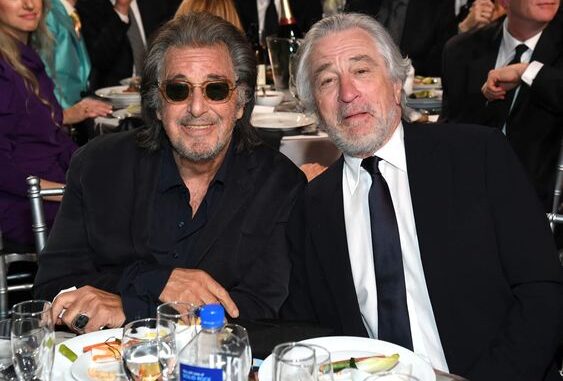
Robert De Niro and Al Pacino: A Big, Beautiful 50-Year Friendship

“We got together early on,” Al Pacino said, gesturing at Robert De Niro. “And we shared something, which was a big thing at the time.” The two men were sitting in a hotel suite in New York, trying to sum up 50 years of friendship and the weird, singular bond that comes from being two of the most heralded actors of their generation. The balcony door was open, to catch the September breeze. Last night Martin Scorsese’s The Irishman, in which they both star, had premiered at the New York Film Festival, and they’d spent nearly every hour since being fêted. And so, despite their often formidable reputations, there was a sweetness about them. “New York Film Festival, this is a prestigious film festival!” Pacino said earnestly.
After the first showing of the film, De Niro and Scorsese emerged onto a balcony in Alice Tully Hall, arms around each other, as the crowd stood to applaud. Later that night, I watched De Niro and Pacino become overwhelmed by well-wishers at an after-party at Tavern on the Green, where Joe Pesci and Spike Lee and Bobby Cannavale mixed in with triumphant Netflix executives in an overheated VIP room. The reviews of the film were good. They looked, sitting on a couch in front of me, like two men who couldn’t believe their luck.
In 1974 they both starred—in separate timelines that never intersect—in The Godfather Part II. It wasn’t until most of the way through 1995’s Heat that they finally appeared in the same frame of the same film, facing off across a diner table, and even then it was for only a few electric minutes. In the interim, both De Niro and Pacino made innumerable classics, and also 2008’s Righteous Kill, the first film in which they shared multiple scenes. In The Irishman—based on Charles Brandt’s true-crime book I Heard You Paint Houses, about the disappearance of Jimmy Hoffa (played in the film by Pacino) and the underworld into which he disappeared (represented by the hit man Frank Sheeran, played by De Niro)—the two men give surprisingly emotional performances, suffused by their history with each other and, in De Niro’s case, with Scorsese. (Somehow this is Pacino’s first role in a Scorsese film, and the first time the three men—along with their costars Pesci and Harvey Keitel—have made something all together.) The movie has the feel of an old and august gang reuniting for one last job and looking back, sometimes ambivalently, on many lifetimes of work about violence and love and loss.
Pacino is three years older than De Niro and visibly protective of him. De Niro is famously a man of few words in life and a man of even fewer words in front of journalists. During the afternoon we spent together, he sat quietly on the couch and barely spoke, except to laugh as Pacino stood to roar or act out characters and scenes from their respective lives. Even now De Niro looks like himself: When he shrugs, you see a dozen iconic movie characters flicker through him. Pacino wore a baseball cap that he periodically removed to reveal a wild mane of hair—the watchful beauty of his youth has long since turned to a mischievous chaos, a visible glee to still be at it. Pacino is on a recent run of characters, as in The Humbling or Danny Collins, ravaged by time and pride, while De Niro has increasingly found himself playing fathers and grandfathers, men who have as much to express and as little to actually say as he himself does.
